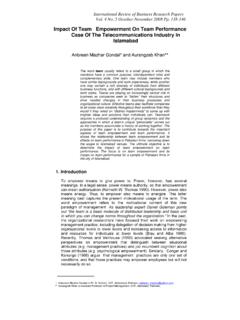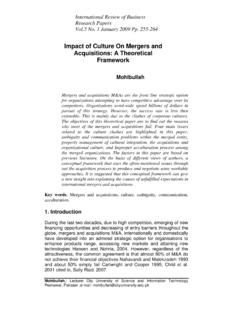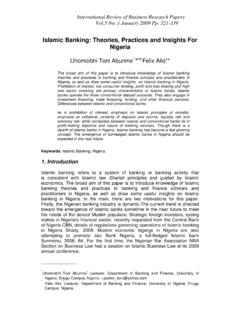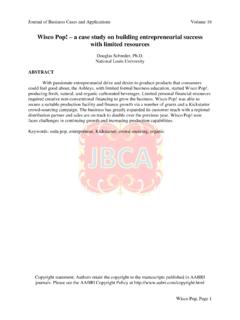Transcription of CHALLENGES FOR SUPPLY CHAIN MANAGEMENT …
1 International Review of Business Research Papers Volume 6. Number 2. July 2010 Pp. 194 - 203 CHALLENGES For SUPPLY CHAIN MANAGEMENT In Today s Global Competitive Environment Aarti Deveshwar* and Rupa Rathee SUPPLY CHAIN MANAGEMENT - The means by which firms engaged in creating, distributing, and selling products, can join forces to establish a SUPPLY network with an unbeatable competitive advantage- has emerged as one of the most powerful business- improvement tools around. Companies all over the world are pursuing SUPPLY CHAIN as the latest methodology to reduce costs, increase customer satisfaction, better utilize assets, and build new revenues.
2 In this fiercely competitive environment, the gap between firms that are succeeding and those that aren t is rapidly expanding. Companies are being impacted right now by SUPPLY CHAIN MANAGEMENT and if any company thinks that SUPPLY CHAIN will not affect it, then it is wrong. The concept is appearing in various industries and is moving into smaller companies. Start to understand what it is and what it means to you. SUPPLY CHAIN MANAGEMENT is a dynamic paradigm driving through companies. Add in the global impact of customers, competitors and suppliers; and the magnitude of the SUPPLY CHAIN is very CHAIN MANAGEMENT is a reverse of prior practices where manufacturers supplied product to customers.
3 Now customers tell suppliers how and when they want their inventory delivered. The driver behind SUPPLY CHAIN MANAGEMENT is to remove inefficiencies, excess costs and excess inventories from the SUPPLY pipeline which extends from the customer back through his suppliers supplier and so on back. By having the program driven by the customer, it is hoped that inventories, caused by uncertainties and slow response, will be significantly eliminated. While there are sales incentives to major suppliers with the carrot of category MANAGEMENT or similar programs, the success of SUPPLY CHAIN MANAGEMENT rests with logistics. The present paper is aimed to understand the SUPPLY CHAIN MANAGEMENT and its relation to logistics, to discuss the CHALLENGES of SCM, how to achieve maximum level of customer satisfaction through SUPPLY CHAIN MANAGEMENT , to recognize the key issues responsible for effective SUPPLY CHAIN MANAGEMENT .
4 Field of Research- MANAGEMENT , SUPPLY CHAIN MANAGEMENT 1. Introduction SUPPLY CHAIN MANAGEMENT is a reverse of prior practices where manufacturers supplied product to customers. Now customers tell suppliers how and when they want their inventory delivered. The driver behind SUPPLY CHAIN MANAGEMENT is to remove inefficiencies, excess costs and excess inventories from the SUPPLY pipeline which extends from the customer back through his suppliers and through his suppliers' suppliers and so on back. By having the program driven by the customer, it is hoped that inventories, caused by uncertainties and slow response, will be significantly eliminated.
5 While there are sales incentives to major suppliers with the carrot of category MANAGEMENT or similar programs, the success of SUPPLY CHAIN MANAGEMENT rests with logistics. _____ *Dr. Aarti Deveshwar, Rupa Rathee, Lecturer, DCR University of Science and Technology, Murthal, Sonepat, Haryana, India. Deveshwar & Rathee 195 Functional Areas of Logistics: 1. Network Design 2. Information Technology 3. Transportation 4. Inventory and Storage 5. Warehousing 6. Materials Handling, Loading and unloading 7. Packaging and Re-packaging The customer requirements may vary by customer, but they do have certain consistencies to logistics-- Quick response to orders from order receipt through shipment to invoicing Complete and accurate orders / no backorders Delivery windows or appointments Special shipment preparation as to packaging, marking, labeling, stenciling, slip sheets or pallets, etc.
6 Bar coding EDI Carrier selection The initial benefits of SUPPLY CHAIN MANAGEMENT accrue to the customer, the initiator of his SUPPLY CHAIN . He earns the reduction in inventories by driving out excesses inventories which he must purchase, store and be responsible for. The impact of SUPPLY CHAIN MANAGEMENT to the supplier may be more difficult to classify, initially, as benefits. They may vary, but may include-- Fewer orders initially while the customer draws down excess inventories. Small and more frequent orders. Vendor carries inventory, not the customer. Higher warehousing costs for picking smaller and more orders. Higher freight costs for shipping smaller order and more orders.
7 Penalties for not meeting the customer's requirements. Possible loss of business for not meeting the customer's requirements. If a company has one hundred customers, he may have one hundred customer practices. This is the most challenging job for SCM to keep all the customers satisfied rather delighted. Emphasis is presently on the initial customer-supplier link. The effects ripple through the SUPPLY CHAIN , it is more like a "whisper down the lane" impact, where suppliers are not clear as to their role and what they must do. Customers want more quality, design, innovation, choice, convenience and service, and they want to spend less money, effort, time and risk.
8 The SUPPLY CHAIN of a company consists of different departments, ranging from procurement of materials to customer service. SUPPLY CHAIN MANAGEMENT means transforming a company s SUPPLY CHAIN into an optimally efficient, customer-satisfying process, where the effectiveness of the whole SUPPLY CHAIN is more important than the Deveshwar & Rathee 196 effectiveness of each individual department. The five key issues of Logistics Effectiveness are core to SUPPLY CHAIN MANAGEMENT - Movement of Product Movement of Information Time/Service Cost Integration, both internal and external, both organizations and systems SUPPLY CHAIN MANAGEMENT requires a logistics model based on quick order to delivery response.
9 A model which focuses from vendors doors through to delivery to customers doors. The model must meet the customers demanding and specific requirements. It requires organizational flexibility and responsiveness, internal and external teamwork and demands the use of processes and technology. A common practice which causes inefficiencies, excess inventories and high costs is forward-buying. On the surface, it looked like a way to purchase at a low price. But in reality, this practice is inefficient and results in additional, higher costs and negative impact throughout the SUPPLY CHAIN . Forward-buying strains the capabilities of suppliers to respond and for the distribution department of customers to handle the products.
10 It creates an operational and cost inefficiency for both supplier and customer. By forcing excess sales through the SUPPLY CHAIN , then the hidden costs of manufacturing and distribution valleys, after the huge peak caused by the forward-buy can be significant. SUPPLY CHAIN MANAGEMENT is about what the customer demands. It is not about what the supplier is capable of doing at present. 2. Literature Review (John Storey, Caroline Emberson, Janet Godsell, Alan Harrison, 2006) in their paper SUPPLY CHAIN MANAGEMENT : theory, practice and future CHALLENGES critically assess current developments in the theory and practice of SUPPLY MANAGEMENT and through such an assessment to identify barriers, possibilities and key trends.












